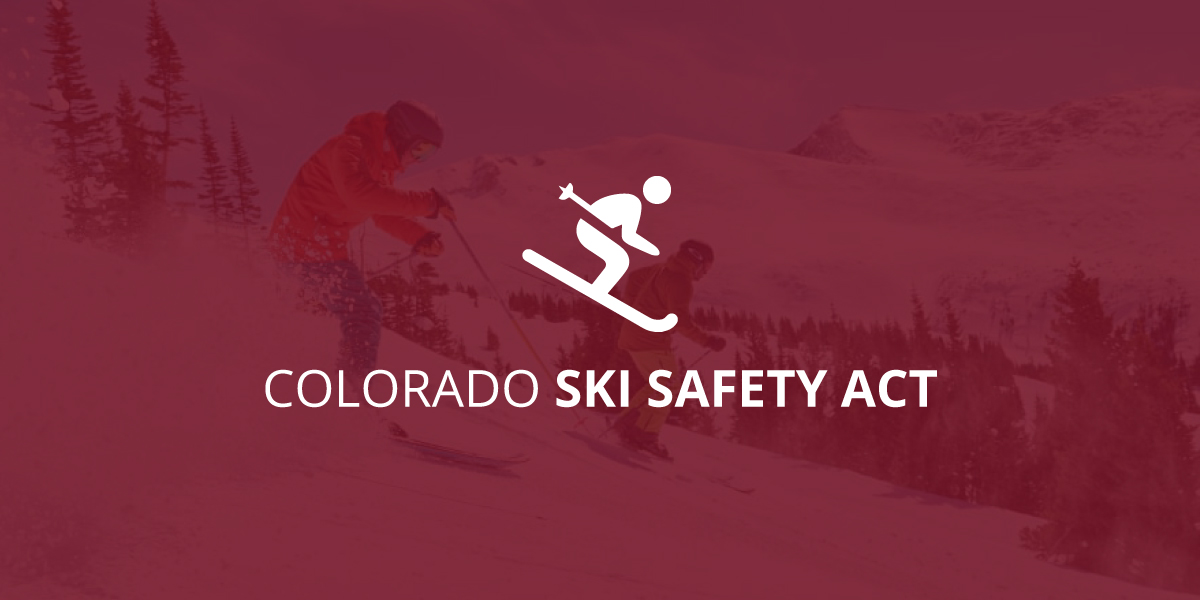Table of Contents
Toggle
Colorado is home to some of the most popular ski resorts in the country. It is not surprising, therefore, that Colorado has a set of laws in place that lay out the responsibilities of both skiers and ski resorts. If a ski resort or a skier is found to be in violation of one of these laws, and an accident occurs, an injured victim may be entitled to compensation.
An Overview of the Ski Safety Act
The Ski Safety Act was enacted in 1979. The stated purpose of the act is to establish reasonable safety standards for operating ski areas. This includes imposing responsibilities on the skiers that use the various ski areas in Colorado.
Violations of the Ski Safety Act may result in a negligence action if damage to property occurs or if someone is injured.
The Ski Safety Act and Rules Regarding Ski Lifts
Ski lifts are a necessity for any ski resort. However, using a ski lift is not without risk. The Ski Safety Act lays out certain rules and prohibitions regarding the use of ski lifts.
First, passengers should not board a ski lift or get off of one in any location except for designated entrance and exit areas.
Additionally, passengers are prohibited from throwing any item off of a ski lift or acting in any way that could cause injury to another individual.
Ski resorts are required to have posted instructions near ski lifts as well. Passengers must follow these instructions, as well as the verbal directions from ski resort employees.
Skiers should never try to get on closed ski lifts.
Finally, skiers should not place objects in the way of a ski lift if doing so could cause another skier to fall down.
Responsibilities of Ski Resorts
Ski resorts also have duties to skiers and other individuals that come onto the property.
First, ski resorts are required to have signs posted that designate ski lift entrances and exits, as well as the weight capacities of these lifts. In addition, there must be signs that list emergency procedure information and other details listed in section 33-44-106 and 107 of the Ski Safety Act.
Ski operators are required to inspect lifts each day before opening.
Every lift ticket is required to have the following warning printed on it:
Under Colorado law, a skier assumes the risk of any injury to a person or property resulting from any of the inherent dangers and risks of skiing and may not recover from any ski area operator for any injury resulting from any of the inherent dangers and risks of skiing, including Changing; weather conditions; existing and changing snow conditions; bare spots; rocks; stumps; trees; collisions with natural objects, man-made objects, or other skiers; variations in terrain; and the failure of skiers to ski within their own abilities.
Snowmobiles and snow-grooming vehicles used by the ski operators must have visible lights on them.
If a skier is acting reckless or careless, the ski operator has the right to revoke that skier’s privileges. It should be noted that ski operators have no legal duty to skiers who ski out of bounds.
Skier Duties
Skiers also have a host of duties as they ski in Colorado:
- First, they are required to watch their speed and keep a proper lookout, especially while skiing downhill. Skiers are expected to ski within their abilities and limits and follow posted signs.
- Skiers must stay off of closed trails and steer clear of any equipment located on these trails.
- Other requirements are listed in section 33-44-109 of the Ski Safety Act.
- Skiers who violate the Ski Safety Act may be found guilty of Class 2 petty offense and charged a fine of up to $1000.
Filing a Negligence Claim
If a ski operator or another skier was negligent and caused your injuries, you may be entitled to compensation. There is a two-year deadline to file a claim.
To prevail in a negligence claim, the injured victim must prove three things:
- The at-fault party had a duty to the victim;
- The at-fault party breached that duty with a negligent act; and
- The victim suffered damages as a direct result of the at-fault party’s negligence.
Violations of the Ski Safety Act that result in injuries are considered negligence.
If an individual prevails in a negligence claim, that individual may be entitled to:
- Medical expenses
- Lost wages
- Pain and suffering
- Damages for permanent physical impairment or disfigurement
- Emotional distress
To prove a negligence claim, experienced Colorado ski accident injury attorneys submit a variety of documents, such as medical records, medical bills, employment records, photographs, video surveillance footage, ski operator incident reports, ski accident reports, and eyewitness statements.
Attorneys are able to help those injured in ski accidents by pursuing all damages on behalf of their clients so that these individuals may focus on recovering from their injuries. In addition, attorneys are able to discuss the claim with experts as needed to strengthen the case.
Call Jennifer Donaldson Today to Discuss Your Ski Accident Claim
Denver personal injury attorney Jennifer Donaldson is experienced in ski accident claims and other injury claims that arise at ski resorts. To schedule a free consultation, contact us at 303-458-5000.

















